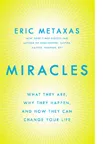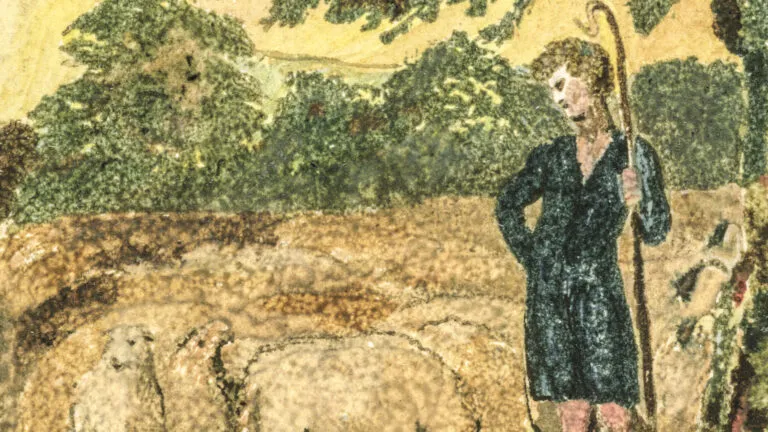“In Science we have been reading only the notes to a poem; in Christianity we find the poem itself.” So wrote C. S. Lewis in his 1947 book Miracles, which influenced generations of Christian writers. One of them is Eric Metaxas, who is best known for his biographies of the English abolitionist William Wilberforce and the anti-Nazi martyr Dietrich Bonhoeffer. His newest book—also titled Miracles—follows in Lewis’s footsteps.
Why did you write this book?
I’m somebody who has experienced miracles. I told an editor about one. He pursued me to write a book about them. I could see two ways the subject could be handled badly. One was to make it too religious. Is there something beyond this world? This is a question everyone has. And then I thought, there are books like The Secret, where there is sloppiness theologically. That does a disservice to the subject of miracles as well.
What were your own experiences with the miraculous?
I grew up more as a Greek than Greek Orthodox. You eat the foods, perform the rituals and go to church. But it was not something that I took particularly seriously. In college at Yale, I bought into secular thinking. Afterward, I was confused in life. I took a job proofreading chemical manuals at Union Carbide. It was there that I met a guy who was serious about his faith. He discussed God with me in a very sensitive way. I still wasn’t buying it, but it began a dialogue.
READ MORE: 5 THINGS YOU NEED TO KNOW ABOUT MIRACLES
Then my uncle died, around my twenty-fifth birthday. I had this dream. I was ice fishing on Candlewood Lake, where I’d spent a lot of time growing up. A golden fish poked through the ice. Not a goldfish, a fish made of gold. I held him up and felt this overwhelming peace. I recognized the fish as a symbol of Christ. Never in my life had I had a dream like that. In it, Jesus basically revealed himself to me. The only other time I had a dream like that was 20 years later.
Before you wrote Bonhoeffer…
I was in my forties. I had a very specific dream of my extended family gathering for a photo in the German village where my mother grew up. I saw myself at five years old, desperately wanting to get in the picture, even though I knew that in real life, I hadn’t been to my mother’s village at that age. Then I woke up. It was strange. I almost never thought about my German roots.
I couldn’t reach my mother, so I called my aunt. She told me that the night before, some relatives had e-mailed her a photo. She sent it to me. Everyone looked exactly as they had in my dream. Did I know the meaning of it? No! Later I came to the conclusion that God really wanted me to write about Germany. That led me to Bonhoeffer.
Not every miracle is like parting the Red Sea.…
Miracles are not just random great things that happen. A miracle is a communication from God. He’s trying to speak to us, to draw us to look at him. He doesn’t want us in the moment we experience the miracle to say, “Oh, that’s great,” and then move on. He wants us to look deeper, to get to know him personally. He’s not a vending machine, where you put in your prayer and out comes the answer.
He’s more like a parent. Your parents love you, even when they deny you what you’re asking for. Sometimes they deny what you’re asking for because they love you.
These stories in Miracles, they’re all about people you know?
It allows me to vouch for their credibility. These are not just stories I read on the Internet. My friend Joni dove from a raft into the Chesapeake and fractured her vertebrae. She was drowning, and no one saw her. Then, I kid you not, a crab bit her sister’s toe. Her sister turned and saw Joni in time to rescue her. Joni’s life was saved, miraculously. Yet she was paralyzed and she’s been paralyzed for 45 years.
Miracles are not always entirely happy. We have to face the big questions. It’s okay to wonder how God could part the Red Sea but doesn’t cure a kid dying of cancer. You shouldn’t be afraid to think about that. When you take in the whole of all he has done, God still comes out looking pretty great.
In the book, you write that life may be more outrageous than the Virgin Birth.…
We shouldn’t be here. The more you look at the tremendous fine-tuning required for a planet to exist that might support life, it’s kind of frightening. Look at what a cosmologist says about the four fundamental forces: gravity, electromagnetism, the weak nuclear force, the strong nuclear force—if any one of them had been slightly different, there’d be no universe. All the things that science says needed to happen in order for life to emerge makes the Virgin Birth and the Resurrection seem like, “What’s the big deal?”
You say that miracles are always “in character” for God.
God is not a trickster, throwing riddles at us. He’s not going to do stuff to play with your head. This is standard biblical theology. Everyone needs to ask themselves, who is the God of the Bible? He is one of grace, mercy. There are some people who believe religion tells them to kill others. There are people who want to create God in their own image. In my Bonhoeffer book, I wrote about how Hitler believed he was on God’s side. That’s not God. He doesn’t work that way. You are either following the devil or your own foolish inclinations.
Can a miracle happen to someone of any faith, or of no faith at all?
The idea that anybody “deserves” a miracle is a fundamental misunderstanding. The Bible says we are all broken. If you think that you are better than anyone you are already in trouble. Unless you have humility you can’t begin to understand God. A bad guy can be changed by a miracle and turn to God. That’s the point. Miracles are not reserved for special people, they’re something that, again, gives us a clue to who God is. He’s merciful and loving because he really does want to reach everybody.
Is there one miracle that you included in this book that you found the most powerful, the most compelling?
There isn’t really one. It’s like asking someone to choose from their children. I really found that what I loved is there are so many kinds of different miracles. Miracles of tremendous healings and people hearing from God. People seeing angels vividly, specifically. People experiencing being saved by what had to be an angel in some dramatic situation.
One friend heard the voice of God and her life was saved on 9/11. That’s astounding. Some of these stories are funny, some are very moving. I just think the breadth of the stories is what makes the book compelling.
Can science do anything to prove or disprove miracles?
We live in a culture that puts out this narrative that faith is either at odds with reason or it’s something that is apart from reason. I say not only is that not true, but it’s a preposterous untruth. I wrote an article about that called, “Science Leading Us to God,” and shared that with The Wall Street Journal and they changed the titled to “Science Increasingly Makes the Case for God.”
There was a firestorm of crazy criticism all over the map and then another wave of people defending my article against the criticism. It became this lightning rod on the debate of the existence of God and everything. People of great faith gave us science. That is a historical fact, because they believed there was a universe designed with order. It’s fascinating.
Can one be more “in tune” with the miraculous? How can someone open themselves up to wonder?
I would say that everyone should just pray to God throughout our days, asking him to speak with us in whatever way he wants to speak to us. God wants us to enter a conversation with him, a dialogue with him, a relationship. We’re not praying to the Ten Commandments, we are praying to the God behind the Ten Commandments. A person, who loves us, who wants to communicate with us.
Some people, as I expressed in the book, hear from God in amazing ways. On some level we all do. I do think that God can lead us in prayer. He can lead us to pray for this or that. I’ve experienced that myself where I feel like God is even guiding my prayers. But you can’t steer a parked car, you have to be praying for God to steer and guide your prayers.
When you pray, you spend time in God’s presence, and you are allowing yourself to see things from his perspective. Which is changing you, even if it doesn’t change your circumstances. Prayer is something that I think is absolutely vital.
Is any miracle too small, too silly? What are we to make of the people who see God’s handiwork in the humdrum of everyday life?
God is everywhere and in everything, so he is as much in the tiniest, most mundane things as he is in the largest things like the parting of the Red Sea and the creation of the world. Nothing is too big for God—and nothing is too small for God either.

Did you enjoy this story? Subscribe to Mysterious Ways magazine.





